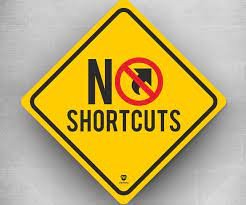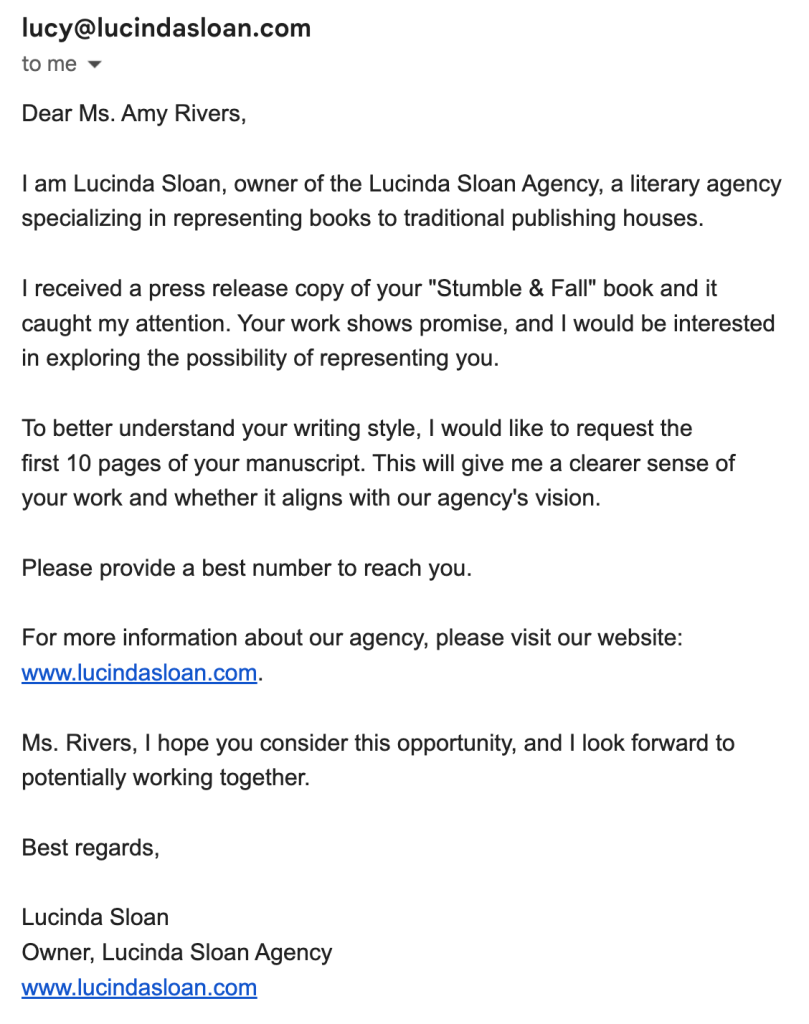By Amy Rivers

As an author, I receive many unsolicited offers via email and social media for everything from reviews and promotions to potential offers of representation from literary agencies.
Very few of these offers are legitimate. Though companies do cold calls or cold emails, most credible companies respond (sometimes) to inquiries you make as an author, not the other way around.
Query. Pitch. Query. Pitch. Query. It’s unavoidable.
Case in point.
I received an email a few days ago from an alleged literary agent requesting pages to review and the possibility of an offer of representation. The most recent solicitation gave me pause.

Anytime I receive an unsolicited email offer like this, I do some research. Although it would be cool to get an offer of representation from a literary agent who read my work and was intrigued, my gut tells me there’s something off.
If it sounds too good to be true, it probably is.
Let me walk you through my thought process and the research I did to evaluate the legitimacy of this inquiry.

Red Flag One:
Though there has been some press about Stumble & Fall, this published book has yet to catch the attention of a literary agent. Agents are looking for unpublished manuscripts to sell to traditional publishing houses. It’s how they make their money.
While I wouldn’t typically respond to emails that raised immediate red flags, I decided to try and then tell the tale this time. Hopefully, it saves some of my fellow writers some trouble.
I emailed Lucinda Sloan back, telling her that the book in question was published in 2022 and that I independently published it under my own imprint.
She responded, asking to see the first 10 pages anyway. Then she asked an odd question.
“Has the book been edited?”
Yes, I answered, both developmental and copy editing. (All my books are professionally edited before they go to print).
At this point, she asked for the first unedited pages of my published book, and the conspiracy theories began swarming my brain. There’s no reason to see unedited pages of a book already in print.
Regardless of the answer, this series of questions and requests was unusual and required more scrutiny.
Red Flag Two:
Sloan claimed to have a Publishers Marketplace listing and be an active American Association of Literary Agents (AALA) member. I went to Publishers Marketplace and found that, yes, she does indeed have a listing.
Still, the listing lacked information about past sales. Then, I went to the AALA website and searched for Lucinda Sloan.
Surprise, surprise. She doesn’t exist in their database.
To confirm my suspicion, I emailed Lucinda and requested the link to her AALA profile. She has yet to respond.
I’m confident Lucinda Sloan is not a legitimate literary agent. Still, I checked out a few other things during this process—all red flags.
In her initial email, Ms. Sloan provided her website address. I always visit the website before responding to get a feel for the company. The website is a dead giveaway that the company is a little sketchy, but in this case, the website seemed convincing.
It contained all the things I’d expect to see on an agent’s website: what she represents, client books, submission guidelines, and a detailed bio.
I had to dig deeper.
I went to the Books page and searched for each client’s book listed in a separate tab. The books are all independently published, with very few reviews and no evidence of ties to a traditional publisher. We’ve all been told a million times that agents rarely consider a previously published book.
They are so rare that we can all list them on our fingers. So, a full page of client books that have been published independently is not a good sign.
If you don’t have Writer Beware bookmarked, do it now. I visited the website and searched for literary agent scams.
Of course, the writers there had a pre-new calendar year article about scammers.
Reading this article reminded me of something I noticed when I first read Lucinda Sloan’s email—the name sounded familiar. A quick Google search revealed that Lucinda Literary is an NYC-based literary agency. Scammers are impersonating real agencies. In this case, the name similarity may lend credibility if the author doesn’t pay close attention.
Ultimately, this is not a legitimate offer, and having done due diligence, I am confident that I am not passing on an opportunity that might benefit me.
I have several reasons for imploring authors to do their homework when evaluating any offers, especially unsolicited ones.
Scammers can be persuasive with their sales pitches. Where in past years, scam emails could be easily spotted by their terrible grammar and spelling mistakes, the communications sent today could be more easily written off.
As in the example above, even the supporting materials like websites and affiliations can look legit on the surface.
Authoring books can be a long and arduous journey. Many scams offer “get rich quick” schemes for gaining social media followers or reviews of your book. As authors, we all want to get our books into the hands of more readers.
Still, it’s important to remember that the overnight successes espoused by these companies do not develop the kinds of author-reader relationships that build a solid fan base.
In other words, having a million followers only helps you out if you are making sales or gaining new readers.
And last but certainly not least, many of these scams target self-published authors. This literary agency scam is incredibly frustrating to me because it assumes that all self-published authors are secretly hoping to traditionally publish.
That may be true for some, but as self-publishing tools improve, many authors make the educated and intentional decision to self-publish. An agent who represents us for foreign or film rights might be excellent. Still, we’re not necessarily looking to publish traditionally.
Success as an author is a long game, regardless of your chosen path to publication. Discovering, building a following, and achieving your goals takes time. There are a lot of handy tools and services out there that can help you along the way, and also a lot of scams that operate with the sole purpose of taking your money.
Knowing how to tell the difference is critical to making good choices in your writing journey.

Terrific blog. Good detective work!
LikeLiked by 1 person